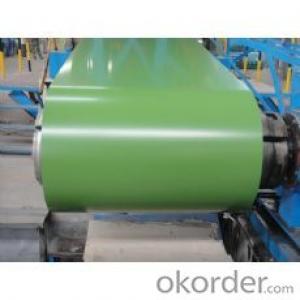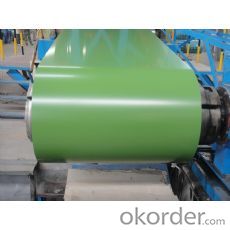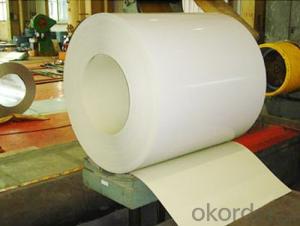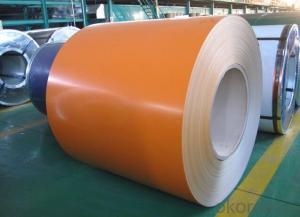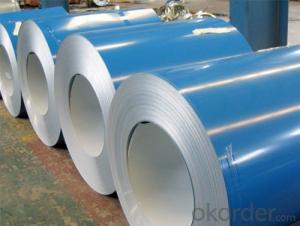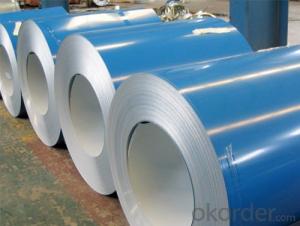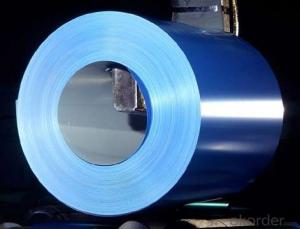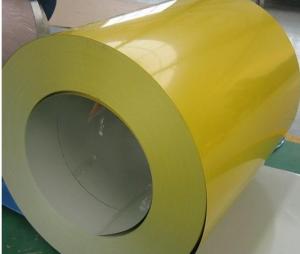PPGI Steel Sheet Coil with Nice Quality and Lowest Price Blue
- Loading Port:
- Qingdao
- Payment Terms:
- TT OR LC
- Min Order Qty:
- 123 m.t.
- Supply Capability:
- 11111 m.t./month
OKorder Service Pledge
OKorder Financial Service
You Might Also Like
1.Structure of Pre-painted Galvanized/Aluzinc Steel Coil Description
With GI (aluzinc) as base metal, after pretreatment (degrease and chemical treatment) and liquid dope with several layers of color, then after firing and cooling, PPGI steel is good capable of decoration, molding, corrosion resistance.
It generally displays workability, durability and weather resistance.
2.Main Features of the Pre-painted Galvanized/Aluzinc Steel Coil
• Excellent corrosion resistance
• High strength
• good corrosion resistance
• perfect weather resistance
• Good formability
3.Pre-painted Galvanized/Aluzinc Steel Coil Images
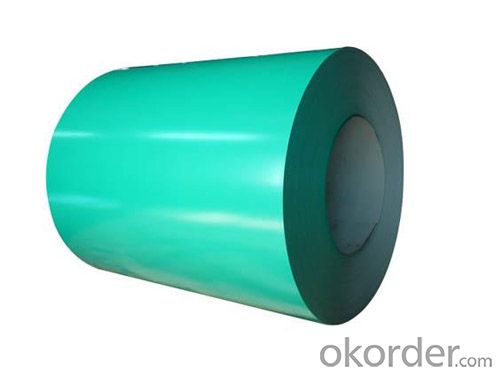
4.Pre-painted Galvanized/Aluzinc Steel Coil Specification
Paint thickness for top side : 5 micron primer + (10-20) microns modified polyester, any RAL color code.
Thickness : 0.14-1.20 mm
Width : 914mm, 1000mm, 1220mm and 1250mm, thickness 600-1250mm is available
Finish by coil or sheet: Both sheet and coil are available
Paint thickness for back side: (5-10) microns Epoxy
Weight per coil: 4-6 tons, also can be upon customer's requirements
Quality standar: JIS G3312 CGCC & CGLCC
Hardness of P: Both soft and hard quality are available
Surface finish: with or without protect film
8Zinc coating: 60-275G/M2, both sides
Max loading weight in one 20ft container : 25 tons generally
5. FAQ of Pre-painted Galvanized/Aluzinc Steel Coil
We have organized several common questions for our clients,may help you sincerely:
1. How to guarantee the quality of the products?
We have established the international advanced quality management system,every link from raw material to final product we have strict quality test;We resolutely put an end to unqualified products flowing into the market. At the same time, we will provide necessary follow-up service assurance.
- Q: I want to know because I'm going to Hershey Park on Wednesday and Steel Force looks about the same size, so, I wanted to know. It's not that Steel Force is too big for me.
- steel force breaks the 200ft mark and is a steel out and back roller coaster. Tidal force is a water ride that is about 100 ft tall. If you can do Steel Force then you should be able to handle anything at Hersheypark. the on;y ride they have bigger is the Kissing Tower
- Q: What are the different types of coil edge trimming machines?
- In the market, one can find a variety of coil edge trimming machines. These machines are specifically designed for the purpose of trimming the edges of coils or rolls made from different materials like metal, paper, plastic, or fabric. Each machine type possesses unique features and capabilities to cater to specific trimming needs. 1. Manual Edge Trimmers: These machines require manual operation where an operator feeds the coil and trims the edges using a cutting tool or blade. Manual edge trimmers are suitable for trimming applications with low volumes and rely on the skill and precision of the operator. 2. Semi-automatic Edge Trimmers: These machines offer automated feeding mechanisms to assist in the coil feeding process. However, the operator still performs the trimming manually using a cutting tool. The feeding mechanism reduces manual effort and increases productivity. 3. Automatic Edge Trimmers: These fully automated machines require minimal operator intervention. Equipped with advanced sensors and controls, they ensure precise and consistent trimming of coil edges. Automatic edge trimmers can handle high volumes of coils and are often integrated into production lines for continuous trimming operations. 4. Rotary Blade Edge Trimmers: These machines utilize high-speed rotating blades to trim coil edges with precision. Commonly used for plastic or fabric coils, they provide clean and smooth cuts. 5. Guillotine Edge Trimmers: These machines employ a guillotine-like cutting mechanism to trim coil edges. The cutting blade moves vertically, resulting in straight and accurate cuts. Guillotine edge trimmers are suitable for trimming metal or paper coils. 6. Laser Edge Trimmers: These machines adopt laser technology to trim coil edges. The laser beam ensures clean and precise cuts, making them ideal for delicate or high-value materials. The choice of the appropriate coil edge trimming machine depends on the specific requirements of the application. Factors such as material type, coil dimensions, trimming precision, and production volume should be taken into consideration. Each machine type has its own advantages and limitations.
- Q: How many percent carbon in low alloy steel and high alloy steel
- Steel is basically an alloy of iron and carbon that has more than 0% carbon and less than 2% carbon. The alloy of carbon and iron with more than 2% carbon is considered cast iron. The bessemer process converts cast iron to steel by injecting oxygen into molter cast iron to burn off the excess carbon. Steel is also modified by adding additional elements like silicon, molydenum, vanadium, chrome, etc.
- Q: What products can we make with steel (eg Steel strip, rod, bar, rail, tube) How are these made? What can we make from these steel products?Can you please make the answers as detailed as possible you can because i really want to know this really well. Thank you.
- Your okorder (they make steel deck and steel joists) There are thousands of other items routinely produced from steel, including rebar, and all the metal in cars, airplanes, and about a million other things.
- Q: How do steel coils contribute to the HVAC ductwork industry?
- The HVAC ductwork industry relies heavily on steel coils as they are essential for creating ducts. These coils, typically made from galvanized steel, offer numerous advantages in this industry. First and foremost, steel coils are known for their durability and longevity, making them perfect for constructing HVAC ductwork. They can withstand high temperatures, pressure, and exposure to various environmental elements. This durability ensures that the ducts made from steel coils can effectively transport air for long periods without deteriorating or compromising their structural integrity. Moreover, steel coils are highly flexible and can be easily manipulated during the fabrication process. HVAC ductwork often requires customization to fit specific building layouts and designs. Steel coils can be effortlessly cut, bent, and shaped without sacrificing their strength. This flexibility allows for the production of ducts in different sizes, shapes, and configurations to meet the unique requirements of various HVAC systems. Additionally, steel coils provide excellent resistance to corrosion and fire. The galvanized coating on the steel surface acts as a protective layer, preventing rust and corrosion caused by moisture or chemical reactions. This corrosion resistance ensures that the ductwork remains functional and safe for an extended period. Furthermore, steel coils contribute to energy efficiency in the HVAC ductwork industry. The smooth surface of steel coils reduces air friction and turbulence within the ducts, resulting in smoother airflow and reduced energy loss. This improved energy efficiency leads to cost savings for building owners and occupants, as it reduces the amount of energy required to maintain a comfortable indoor environment. Finally, steel coils are readily available and cost-effective, making them a popular choice for HVAC ductwork fabrication. The market offers a wide supply of steel coils, ensuring efficient production and installation of ductwork systems. Additionally, their cost-effectiveness makes them an economical option for both small and large-scale HVAC projects. In conclusion, steel coils play a crucial role in the HVAC ductwork industry by providing a durable, flexible, corrosion-resistant, energy-efficient, and cost-effective material for duct fabrication. These unique properties ensure the construction of high-quality ductwork systems that effectively distribute air in buildings, promoting optimal comfort and functionality.
- Q: Can steel coils be coated with zinc-aluminum alloy?
- Yes, steel coils can be coated with zinc-aluminum alloy, which is often referred to as galvalume or zincalume coating. This type of coating provides excellent corrosion resistance and durability to the steel coils, making them suitable for various applications in industries like construction, automotive, and appliances.
- Q: How are steel coils used in the manufacturing of agricultural sprayers?
- Steel coils are used in the manufacturing of agricultural sprayers primarily for constructing the frames, supports, and structural components of the sprayers. The high strength and durability of steel make it suitable for withstanding the harsh conditions and heavy loads associated with agricultural operations.
- Q: Can steel coils be stored in a corrosive environment?
- No, steel coils should not be stored in a corrosive environment as it can cause damage and corrosion to the coils, reducing their quality and durability over time.
- Q: What are the different types of steel coatings for coils?
- There are several different types of steel coatings available for coils, each offering unique properties and benefits. Some of the most common types include: 1. Galvanized Coating: This is the most widely used type of steel coating for coils. Galvanized steel is coated with a layer of zinc, which provides excellent corrosion resistance and protection against rust. It is ideal for outdoor applications or environments with high moisture levels. 2. Galvannealed Coating: Galvannealed steel is a type of galvanized coating that undergoes additional heat treatment, resulting in a matte finish and improved paint adhesion. It offers enhanced corrosion resistance and is often used in automotive and construction industries. 3. Aluminized Coating: Aluminized steel is coated with a layer of aluminum, which provides excellent heat resistance and corrosion protection. It is commonly used in exhaust systems and other high-temperature applications. 4. Organic Coatings: Organic coatings, such as paint or powder coatings, can be applied to steel coils to provide additional protection against corrosion, as well as aesthetic appeal. These coatings come in a wide range of colors and can be customized to meet specific requirements. 5. Tin Coating: Tin-plated steel coils are coated with a layer of tin, which offers excellent solderability and corrosion resistance. It is commonly used in the manufacturing of cans and other food packaging materials. 6. Phosphate Coating: Phosphate coatings are typically applied as a pre-treatment before other coatings to improve adhesion and corrosion resistance. They create a thin, crystalline layer on the steel surface, promoting better paint or powder coating adhesion. These are just a few examples of the different types of steel coatings available for coils. The choice of coating will depend on the specific application requirements, considering factors such as corrosion resistance, heat resistance, paint adhesion, and aesthetic considerations.
- Q: Can steel coils be used in the automotive industry?
- Yes, steel coils can be used in the automotive industry. Steel coils are commonly used in the manufacturing of various automotive components and parts. They are particularly suitable for applications that require high strength and durability, such as body panels, chassis components, suspension parts, and engine components. Steel coils provide excellent structural integrity, corrosion resistance, and impact resistance, which are crucial characteristics for automotive applications. Additionally, steel coils can be easily formed and shaped into the desired dimensions, making them highly versatile and cost-effective for automotive manufacturers. Overall, steel coils are widely utilized in the automotive industry due to their exceptional mechanical properties and suitability for various automotive applications.
Send your message to us
PPGI Steel Sheet Coil with Nice Quality and Lowest Price Blue
- Loading Port:
- Qingdao
- Payment Terms:
- TT OR LC
- Min Order Qty:
- 123 m.t.
- Supply Capability:
- 11111 m.t./month
OKorder Service Pledge
OKorder Financial Service
Similar products
Hot products
Hot Searches
Related keywords
